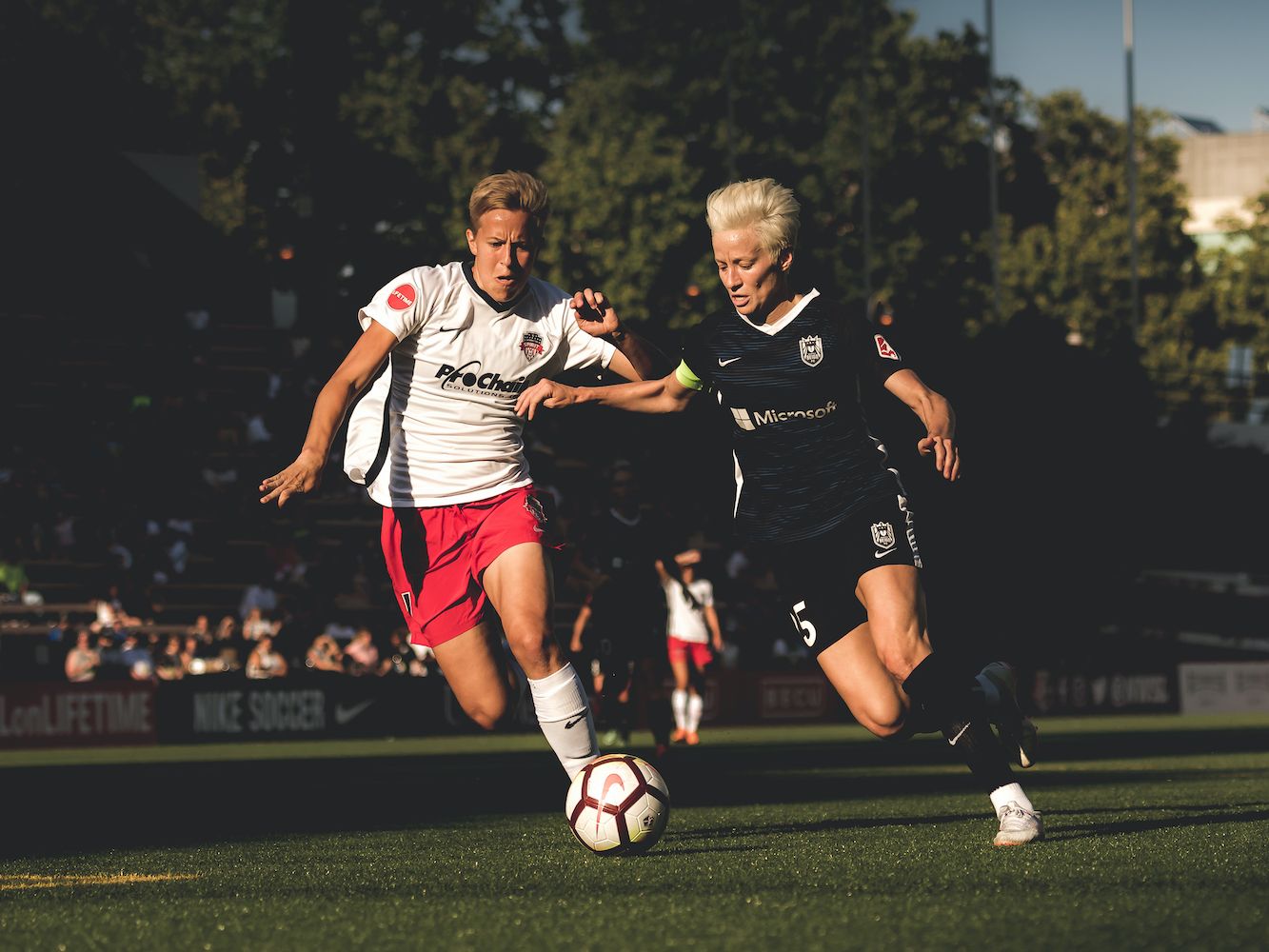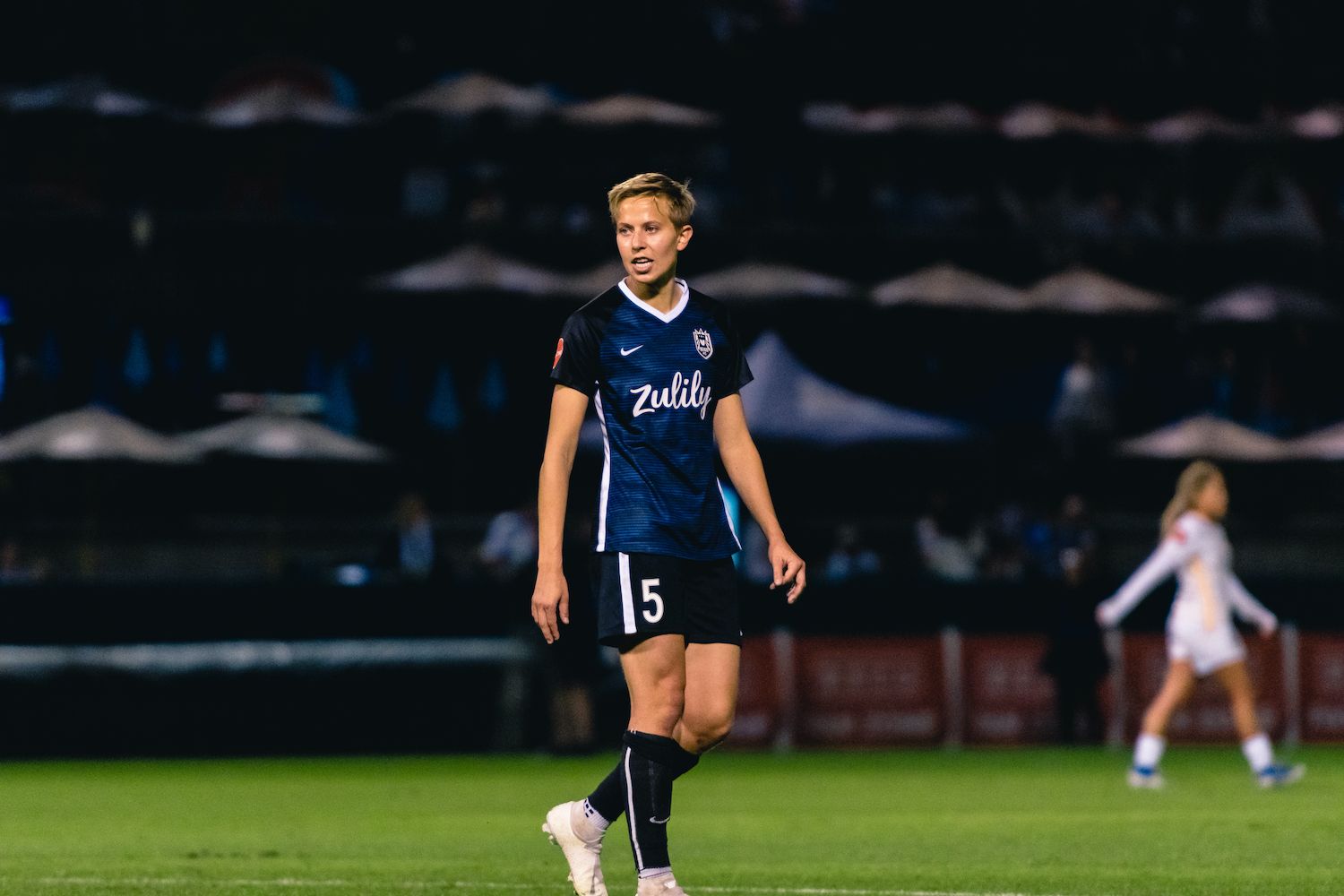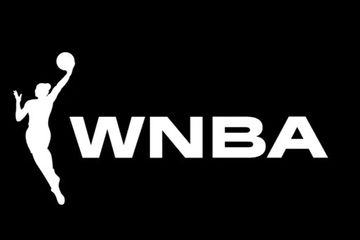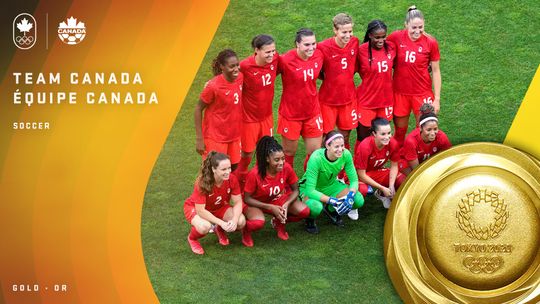(Photo: Nikita Taparia)
It's been just over two weeks since Canadian national team member and OL Reign player Quinn publicly came out as trans. Their Instagram post – pointing out that "coming out is hard (and kinda BS)" and providing a list of actionable items for cis allies – was met with outpouring support from teammates and fans alike.
I had the opportunity to talk with Quinn about coming out, LGBTQ activism, and their goal of elevating trans voices besides their own. The following conversation has been lightly edited for length and clarity.
Leo Baudhuin: I wanted to say thanks for coming out. I know you said in your post that coming out is kind of BS, which it is, but I think it’s cool that you did that anyway, because I don’t think there's a lot of openly trans people in sports, or in women's soccer.
Quinn: Coming out is so frustrating, but I think that there is, just to what you were saying, I think it's a good thing, even though it's a frustrating process for sure.
In your post you also talked about the fact that you’ve been out to pretty much everyone who matters in your life, which I think is cool, because there's such a pressure if you're a queer person and you're not out publicly, that you're somehow hiding part of your identity and misleading people, [which is ridiculous]. I wanted to ask if there was a reason that you chose to come out publicly now – did it just feel right, or was there something else that led to that choice?
I was actually, just before getting on this call, talking about that with someone, because I was doing another interview. I was saying that I felt like I was living two separate lives.
I hate the fact that I have to explain that and say that there's always this trope that trans people are deceptive in that sense, which it's like, the reality is people were making this assumption about who I was. Me coming out publicly was just – unfortunately, I knew I was going to have conversations and be faced with a little bit of scrutiny with that, and so I think that just acknowledging what you were saying with that – there's so much truth to that.
But the reason, I guess, for coming out, there was a multitude of reasons, behind that. First and foremost, I just wanted to be my authentic self in every sphere of my life and be respected by everyone on my sports teams, but media as well; being a public figure, I wanted just to live authentically and have my identity be respected.
Another aspect in coming out publicly is because I wanted to have more trans representation in more public spaces. I think that was so crucial for me when I was figuring out my trans identity, was to be able to see trans people be successful in their careers – whether it was through politics, whether it was through writing, whether it was through sports. I think that gave me a lot of hope for my future.
And I also wanted to do it because I want to move the conversation forward. I know I’m so privileged in those aspects, of being able to have a career and being able to be out and have some sense of safety – even if it's not always safe at times. Where others, unfortunately – trans women, trans women of color – who can’t come out with that same amount of safety. So I wanted to move the needle forward, and hopefully with me coming out, it can pave the way for making a more inclusive and safe space for other trans athletes and just for the trans population in general.
You've mentioned that having visible trans people has been really important for you, personally, and I was wondering if there's any particular people who you really look to and what that meant to have them as visible people to look to.
In my sporting realm, Harrison Browne is a retired professional hockey player – ice hockey is kind of weird to say, hockey player – and he's also Canadian, and so that was really nice. [We] have a friendship now, but I think he was a person that I leaned on trying to navigate a "women's" professional sporting realm. He was also navigating that experience, and so that was really nice to see someone in a similar space.
But there's other people through politics: Sarah McBride, Janet Mock, Laverne Cox. There's so many really cool, out trans folks and nonbinary folks as well, like Jacob Tobia is a fellow Duke graduate, and so that was another person that was out and being visible. There's so many people for sure.
How does it feel that you’re now in that group of people that other trans people are going to look to as an out public figure?
I have a lot of different feelings with that. Unfortunately, because there isn't a huge group of people that are out and so visible and so public, I did feel like there was some pressure with that. I'm only one person in the trans community, and I only have my own experience to speak on.
I want to use this space to move the conversation forward, but I also think I need to be uplifting other voices of other trans folks. I don't want my narrative to be the only one, and I did feel like there was a little bit of pressure with being one of a few people in my field. It is a little scary at times, but I'm also really proud of being able to speak out and being amongst those people and giving younger trans folks hope.
You've been pretty vocal as a queer activist with Athlete Ally, and I heard you did some work with trans inclusion policy at Duke. I assume that's something you’re going to continue to do–
Mm-hmm.
And I was wondering what you see as the power of being a visible and out trans person in doing that work going forward.
That's definitely work that I'm interested in continuing doing. I did a little bit – or, I shouldn’t say a little bit – but I did some work at Duke with the focus of trying to change our policies around trans inclusion. It was definitely met with some opposition, and so that was frustrating for me. I want to continue to do that work, because I know my experience specifically at Duke wasn't the most inclusive, and I know that is also the same in my professional sporting environment. It's not at the place that I wish it was in terms of inclusion, and there's still so many times where I have to be vocal about myself belonging in those spaces – whether it's just even entering locker rooms and having security guards push me out of the way, or being able to get on the pitch at halftime, like I've had instances where I can't even physically get into those spaces.
So I think there's definitely a long way to go, and then I think it's a huge topic right now. We see in America at least – and I know in other parts of the world – where trans youth aren't being allowed to play sports, and I think that resonates a lot with me. As a young person, that was a safe space for me and a space where I could express myself and a space that brought me a lot of joy. That's hugely concerning, and it's heartbreaking for me to think that there are people that can't play sports that they love, and even just at that amateur, youth level.
You kind of touched on this, but women's soccer as a sport is pretty accepting towards queer people. In my experience, and I think this is less [specific to] women's soccer and more sports just being really separated by the gender binary... It still tends to be a pretty cisnormative space, especially in women's sports where there's a lot of policing of bodies when it comes to trans bodies and the bodies of athletes of color.
It's definitely a system where it's super rigid in terms of the binary, and also, yeah, the policing of trans bodies is a huge problem. I think there doesn't need to be that rigidity in terms of it.
I can say it on an anecdotal level, in terms of something like uniforms, like there’s no need to have this super hyper-binary in terms of femininity and masculinity in our uniforms. I don't think that's benefiting both trans and cis folks. I know there's a lot of people on my Reign team who don’t wear our regular training shorts... They're wearing different shorts [for] training just because they feel more comfortable in it. It's the cis people as well; that's not benefiting anyone.
And then if you see it from a larger scale, we're having both cis and trans women that aren’t being able to compete in their sports because they don't fit into this white, colonial version of what it means to be a woman. That's not beneficial to sports as a whole, and it's so exclusionary to a large group of people. I think that’s getting away from the reason why everyone's playing sports: to celebrate bodies and to have joy and to express yourself through your body. I think that can be so harmful for everyone in that system, not just trans folks.

Something else that I've been thinking about a lot, is that it feels like a lot of the times when I've come out in cis spaces and just been like, "these are my pronouns," it feels like I'm inherently making some kind of statement, and I'm giving people the power to disagree with the fact that I exist as a trans person. I was wondering if, in your experiences coming out to people, you have any ways you've developed to make that feel more comfortable for yourself.
I mean yeah, as we've discussed, I think the topic of coming out – or just like the notion of it – is so frustrating. It's bullshit, because every day I'm exploring my gender and how I present myself and what that means in our society.
I'm a forever-changing person in that sense, but I haven’t changed from the person that I was as a child. Like, I am me. I'm just my quirky self. That assumption that I was supposed to be this, this, and this, or this is how I'm supposed to act is – it's frustrating that I have to verbalize or declare myself as against that, when I've just always been myself.
But, yeah, I often find that – and I'm navigating that notion right now of this being such a point of conversation. In some senses, I think that's so beneficial in moving the needle forward in our society that we're having these conversations, and in other senses, I'm like oh my gosh I have to put my trauma on display for people to care or people arguing if it's okay or not, when really I'm just being myself.
But, to answer your question about is there stuff that I have done to make that easier, no.
I mean, it's something that you grow over time, and I'm sure you’ve experienced this as well as a trans person, but you're kind of forged in the fire. You're consistently faced with transphobia in your life, and so you grow this beautiful rainbow shell of how to adapt and deal with those situations. It's something that I’m definitely proud of but has come with a fair bit of pain, and so there's situations that I don't even think about anymore – in terms of not being allowed in my locker room – because they're so pervasive. But I think it's just a testament to how I’ve been able to adapt and handle it and grow my own confidence in who I am.
It’s kind of a shitty situation to be in, but it's cool that you’ve grown from it, I guess? Like you don't want to be there in the first place –
No, no, no, no, no, but I think it's a testament to trans folks and being able to, I don’t know, we're strong as hell, you know?
Something you also mentioned in your Instagram post is wanting to encapsulate the feelings you have about being trans, but Instagram not really being the space for that.
I mean, yeah, I think social media is one thing. Social media is a weird space in of itself. It's fast information; you're clicking like and you're scrolling onto the next post in a couple of seconds. I didn't think that I could embody what my experience has been as a trans person in however many characters you're allowed on an Instagram post.
And I didn't even think that was the most productive use of the space either, like there's other spaces where I can have those conversations, and where it benefits folks. Maybe that's other trans folks, or cis folks that are close to me. But I really wanted to start by moving the needle forward in these conversations about how we can have better allyship in our society, and so I thought that that was a productive use of that post. I know that's just a start, but to me that's where change is really going to happen, and it's going to impact other trans folks as well.
As a fun question to wrap things up, you’re in Sweden right now. Are there any cool plants there?
Are there any cool plants? No! I haven't wanted to purchase a plant, to be honest, because I don't know what I'm going to do with it after the next six weeks. My host family has given me a bunch of fake plants, and I haven't wanted a fake plant, but they definitely have increased my spirits, so I have learned something about how fake plants can actually be kind of fun as well.





